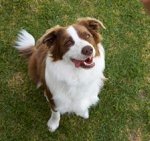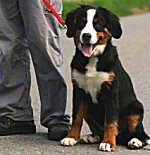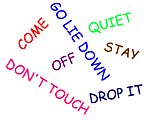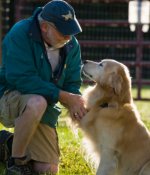Chesapeake Bay Retrievers: What's Good About 'Em, What's Bad About 'Em
Chesapeake Bay Retriever temperament, personality, training, behavior, pros and cons, advice, and information, by Michele Welton, Dog Trainer, Behavioral Consultant, Author of 15 Dog Books
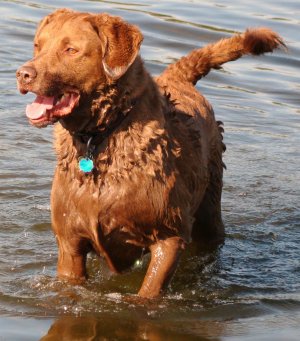
The Chesapeake Bay is the most powerful of the retrievers, with the strongest personality.
This rugged dog should be taken hiking and swimming as often as possible. A walk around the block is not nearly enough to maintain his muscle tone or to satisfy his working instincts.
This breed needs a job to do (learning obedience exercises, fetching a stick or ball, canine fieldwork), else he will find his own ways to keep himself busy, and you may not appreciate his choices.
Unlike the more popular Labrador and Golden Retrievers, the Chesapeake is intensely loyal to his family, reserved with strangers, and possessed of good discriminatory instincts. Thus he makes a fine watchdog, but is not usually aggressive toward strangers.
Most Chesapeake Bay Retrievers are fine with the pets in their own family, but can be territorial with strange dogs and cats.
As with all retrievers, you must control his tendency to chew on objects and to mouth your hands. Provide a box filled with toys so he can carry something around in his mouth if he wants to.
Confident leadership and obedience training are required to develop respect. Chesapeakes will test members of the family to find his place in the pecking order. If you don't take the top position, he will.
If you want a dog who...
- Is the most rugged of the six retriever breeds
- Has a short harsh "kinky" coat that comes in natural earthtone shades
- Loves the great outdoors and thrives on vigorous athletic activities
- Is steady-tempered and dependable
- Is more serious and more discriminating with strangers than the happy-go-lucky Golden or Labrador Retrievers
A Chesapeake Bay Retriever may be right for you.
If you don't want to deal with...
- Vigorous exercise requirements
- Rowdiness and exuberant jumping, especially when young
- Destructiveness when bored or not exercised enough
- Aggression or shyness toward people, when not socialized enough
- Strong-willed mind of his own, requiring a confident owner who can take charge
- Territorial aggression toward dogs and cats he doesn't know
- Mouthiness – carrying and chewing objects, mouthing your hands
A Chesapeake Bay Retriever may not be right for you.
 |
Dog Breed Traits – Which Traits Are Right For You? In this brand new series, I'll help you decide which dog breed traits would best suit you and your family, your home and yard, and your lifestyle, so you can choose the best dog breed for your family. |
Keep in mind that the inheritance of temperament is less predictable than the inheritance of physical traits such as size or shedding. Temperament and behavior are also shaped by raising and training.
FREE eBooks by Michele Welton
![]() "Respect Training for Puppies" and "Teach Your Dog 100 English Words" are free step by step guides to teaching your pup to be calm and well-behaved.
"Respect Training for Puppies" and "Teach Your Dog 100 English Words" are free step by step guides to teaching your pup to be calm and well-behaved.
![]() "11 Things You Must Do Right To Keep Your Dog Healthy and Happy" is a free guide to keeping your dog mentally, physically, and emotionally happy and healthy so you can enjoy a longer lifetime of companionship.
"11 Things You Must Do Right To Keep Your Dog Healthy and Happy" is a free guide to keeping your dog mentally, physically, and emotionally happy and healthy so you can enjoy a longer lifetime of companionship.

- You can avoid some negative traits by choosing an ADULT dog from an animal shelter or rescue group. With an adult dog, you can easily see what you're getting, and plenty of adult Chessies have already proven themselves not to have negative characteristics.
- If you want a puppy, you can avoid some negative traits by choosing the right breeder and the right puppy.
More traits and characteristics of the Chesapeake Bay Retriever
If I was considering a Chesapeake Bay Retriever, I would be most concerned about...
- Providing enough exercise and mental stimulation. Chesapeake Bay Retrievers are rugged working dogs who need regular opportunities to vent their energy and do interesting things. Otherwise they will become rambunctious and bored, which they usually express by barking and destructive chewing. Bored Chesapeakes can make a shambles of your house and yard.
- Bounciness. Young Chesapeake Bay Retrievers (up to about three years old) romp and jump with great vigor, and things can go flying, including toddlers or infirm people.
- Providing enough socialization. Though not guard dogs, many Chesapeake Bay Retrievers have mild protective instincts. They need extensive exposure to friendly people so they learn to recognize the normal behaviors of "good guys." Then they can recognize the difference when someone acts abnormally. Without careful socialization, their natural standoffishness could become suspiciousness, which could lead to aggression.
- The strong temperament. It bears repeating that Chesapeake Bay Retrievers are not eager-to-please Golden Retrievers. The best Chesapeakes are versatile working dogs, capable of learning a great deal. But they have a keen independent mind of their own and are not pushovers to raise and train. Some Chesapeakes are willful and dominant (they want to be the boss) and will make you prove that you can make them do things. You must show them, through absolute consistency, that you mean what you say.
To teach your Chesapeake to listen to you, "Respect Training" is mandatory. Follow my free online training programs.
- Potential animal aggression. Some Chesapeake Bay Retrievers, particularly males, are not tolerant of other male dogs. Some individuals do not get along with cats, while others are fine.
- Potential health problems. All of the retriever breeds are susceptible to crippling joint and bone problems, and eye diseases. Read more about Chesapeake Bay Retriever Health.
My best-selling books – now available FREE on my website
 Respect Training For Puppies: 30 seconds to a calm, polite, well-behaved puppy is for puppies 2 to 18 months old. Your puppy will learn the 21 skills that all family dogs need to know. Click here to read for free.
Respect Training For Puppies: 30 seconds to a calm, polite, well-behaved puppy is for puppies 2 to 18 months old. Your puppy will learn the 21 skills that all family dogs need to know. Click here to read for free. Teach Your Dog 100 English Words is a unique Vocabulary and Respect Training Program that will teach your adult dog to listen to you and do what you say. Click here to read for free.
Teach Your Dog 100 English Words is a unique Vocabulary and Respect Training Program that will teach your adult dog to listen to you and do what you say. Click here to read for free. 11 Things You Must Do Right To Keep Your Dog Healthy and Happy helps your dog live a longer, healthier life. Get my honest advice about all 11 Things before you bring home your new puppy, because some mistakes with early health care cannot be undone. Click here to read for free.
11 Things You Must Do Right To Keep Your Dog Healthy and Happy helps your dog live a longer, healthier life. Get my honest advice about all 11 Things before you bring home your new puppy, because some mistakes with early health care cannot be undone. Click here to read for free.Related posts you might enjoy



